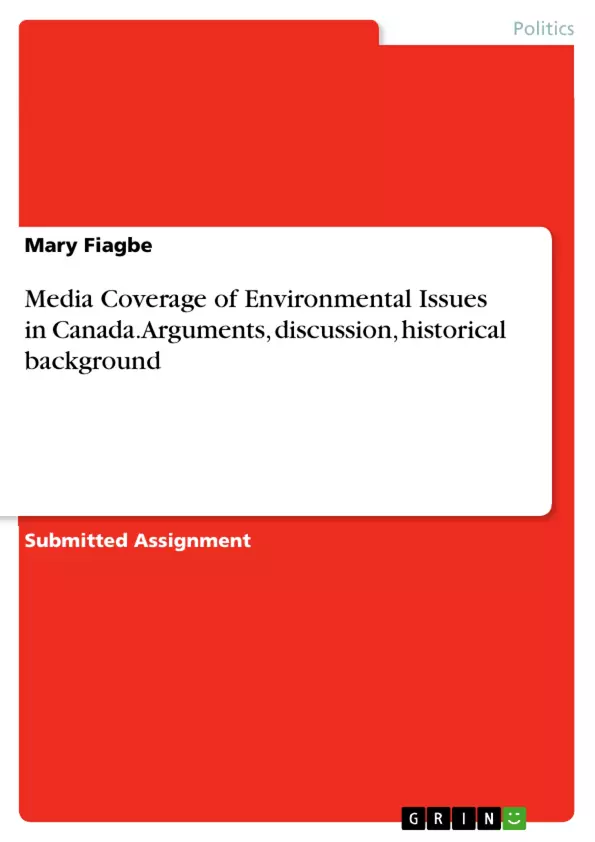The paper in question will focus on Canadian environmental policies in the political field, especially those concerned with climate change. Environmental policies have remained a very delicate and important part of Canadian policy for a long period of time. This is because they tend to affect the domestic and international wellbeing of the country and as such must be handled with extreme caution. This is reflected in the themes associated with the academic sources used for this paper, which will be in the first section. The body of the paper is divided into seven sections. The first four sections have to do with the main themes discussed in the academic sources, and how these themes are stated in the newspaper articles. That is, if they are covered in the articles or not. The third section examines if the newspaper articles include academic or historical facts. Next, the paper shows the extent to which academic arguments are portrayed in the articles –that is, overstating or understating academic arguments. The last section gives a summary of the paper, evaluating media coverage on environmental issues.
When referring to environmental issues in terms of politics, it is important to note that such issues not only affect politics, but also have an effect on the social and economic aspects of a country, especially its people. The main goal of this research paper is to assess the media coverage of environmental issues in Canadian politics. This refers to how the Canadian media tends to frame such issues and how informed the coverage of such issues are. In order to do this, this paper is going to use four different academic readings as well as two newspapers, namely: the National Post and the Globe and Mail to evaluate the quality of such coverage.
Table of Contents
- Introduction
- The three domestic variables
- Climate policy integration: Canadian federal and provincial levels
- Canadian federal and provincial revenue sharing
- North American Policy regime: US - Canada climate policies
- Historical and Academic context of newspaper articles
- Portrayal of academic arguments in newspaper articles
- Conclusion
Objectives and Key Themes
This research paper aims to evaluate the media coverage of environmental issues in Canadian politics, specifically focusing on how the Canadian media frames these issues and the level of informedness in their coverage. The paper analyzes four academic readings and two newspapers (the National Post and the Globe and Mail) to assess the quality of media coverage on environmental policies, particularly those related to climate change.
- The influence of three domestic variables (electoral incentives, political ideas, and institutional context) on a country's stance on climate change policies.
- The role of public opinion, including the actions and insights of voters, interest groups, environmentalists, trade unions, and businesses, in shaping political decisions regarding climate policies.
- The potential impact of media coverage on public opinion and its influence on policy-making.
- The potential biases and influences that may affect media coverage of environmental issues, particularly in relation to economic interests.
- The challenges of implementing effective climate change policies, particularly in the context of differing political ideologies and economic interests.
Chapter Summaries
The first chapter introduces the paper's objective and scope, highlighting the importance of environmental issues in Canadian politics and the need to analyze the media's role in shaping public understanding. The second chapter delves into Harrison's (2007) concept of three domestic variables—electoral incentives, political ideas, and institutional context—that influence a country's approach to climate change policies. The chapter examines how these variables are reflected in the media coverage of Canadian climate change policies, particularly in the context of the Kyoto Protocol and the Trudeau government's climate change initiatives. The third chapter focuses on the role of public opinion in shaping climate change policies, exploring how different stakeholders, including businesses, labor unions, and environmental groups, influence political decisions.
Keywords
The key themes and concepts explored in this paper include media coverage of environmental issues, Canadian climate change policies, public opinion, political decision-making, the Kyoto Protocol, the three domestic variables, and the influence of economic interests on policy-making.
Frequently Asked Questions
What is the main goal of this research paper?
The paper assesses how Canadian media frames environmental issues, specifically climate change policies, and how informed that coverage is.
Which newspapers are used for the evaluation?
The researcher analyzed two major Canadian newspapers: the National Post and the Globe and Mail.
What are the "three domestic variables" mentioned in the study?
The variables are electoral incentives, political ideas, and institutional context, based on Harrison’s (2007) framework.
Does the media accurately portray academic arguments?
The paper examines whether newspapers overstate or understate academic arguments and if they include historical facts in their reporting.
How do economic interests influence climate policy coverage?
The study explores potential biases in media coverage that may favor economic interests over environmental protection.
Which international agreement is frequently referenced?
The Kyoto Protocol serves as a key context for analyzing Canadian climate change initiatives and media framing.
- Citation du texte
- Mary Fiagbe (Auteur), 2016, Media Coverage of Environmental Issues in Canada. Arguments, discussion, historical background, Munich, GRIN Verlag, https://www.grin.com/document/355920



